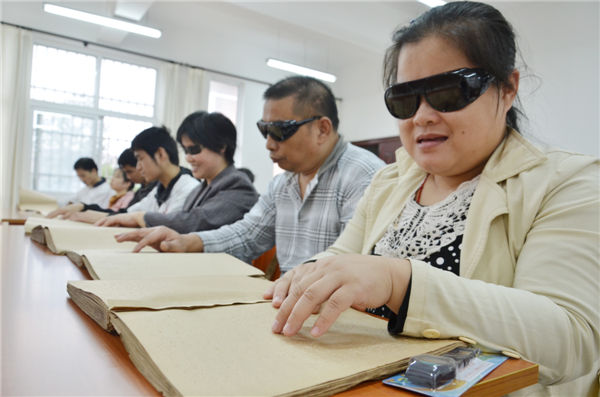 |
|
Visually impaired people read at a library in Hefei, Anhui province, on World Sight Day in October 2013. [Photo/China Daily] |
In 2011, the library moved from the outskirts of Beijing to a more central location near the Temple of Heaven, but as the only specialist library it is still too far for many readers in a big city. In a bid to overcome the problem, the library has teamed up with volunteers, who escort blind people on visits and organize activities for them.
"I don't know Braille, the volunteers read books to me," says Yan, who gives only his surname. He comes to attend a book club held at the library twice a month. "To discuss books with others adds more joy to my reading experience."
Besides book clubs, the library also organizes computer training, lessons on musical instruments and public speaking.
"We've been shifting our position from being a passive provider of resources to a proactive educator, motivating the blind to make full use of our facility and services," says Ma.
Among China's 17 million blind people, only around 10 percent are estimated to know Braille. For the rest, hearing is their only way to books. However, Chinese publishers don't have too many audio-enabled books for the blind.
Hongdandan is a Beijing-based nonprofit that "provides cultural products through voice", and one of their primary services is to record audiobooks. Founded in 2003, the organization started out as a provider of broadcast training to the blind.
"Then visually impaired children asked us to record books that they wanted to read but didn't have them in Braille versions," Zheng Xiaojie, founder of Hongdandan, says of the nonprofit's foray into audiobooks in 2007.
In 2011, she founded a small library of audiobooks called Xinmu, meaning "eyes in the heart", which holds nearly 400 books in Daisy format, the international standard layout for audiobooks recorded for blind readers.
Zheng says that the process of producing quality books requires a lot of time, and given Hongdandan's nonprofit status, most of the work is done by volunteers, pegging such projects on limited resources.
|
|
|
|
|
|
|
|
